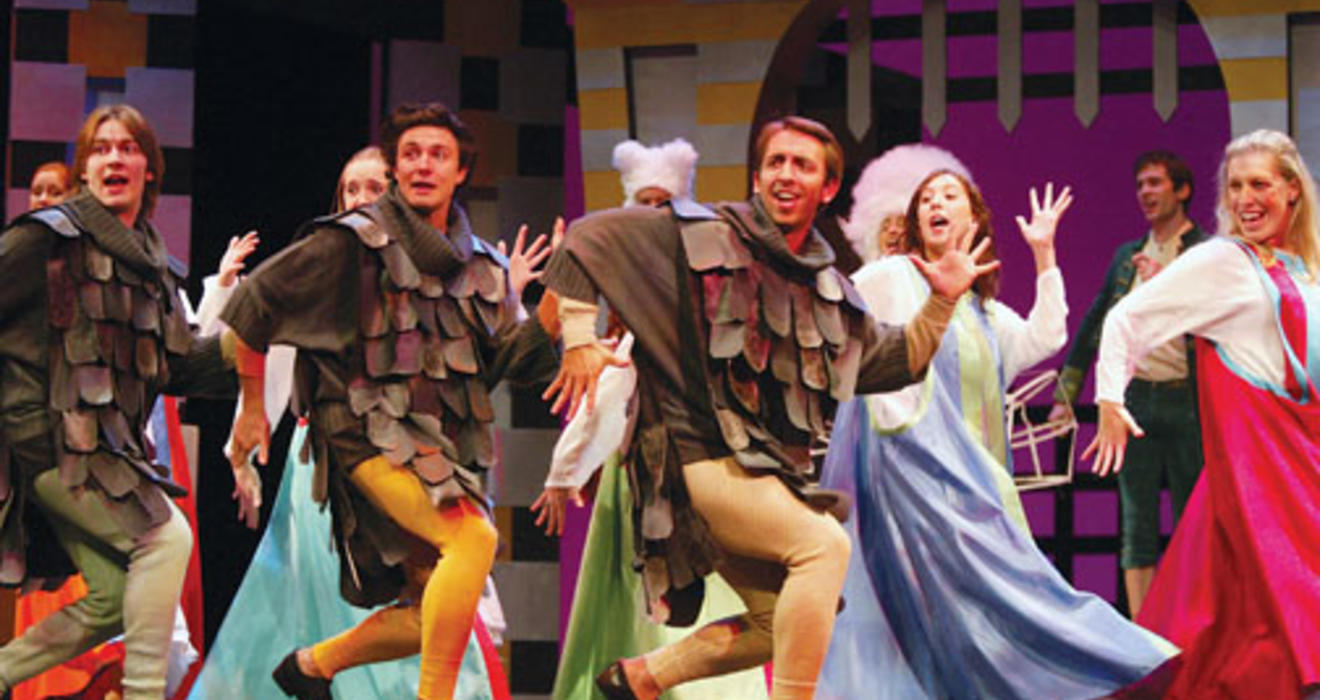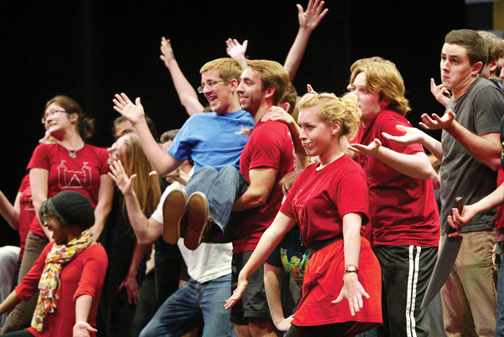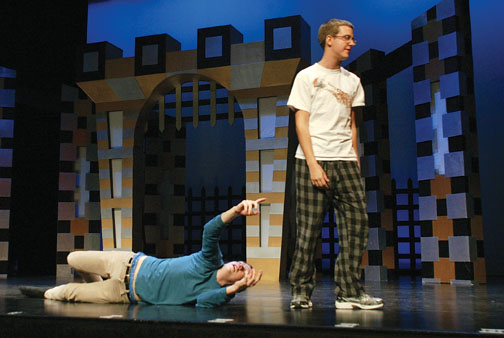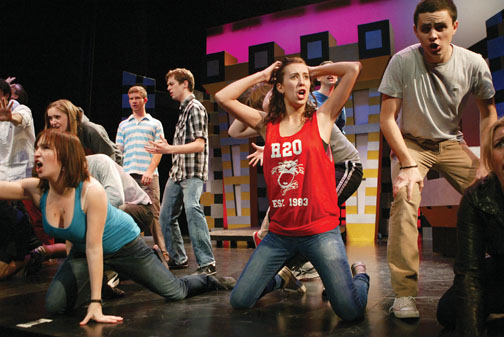
Behind the scenes with Triangle
What it takes for Princeton’s famed musical-comedy troupe to mount its show
With its new show, “Family Feudalism,” Triangle Club is celebrating its 120th anniversary – 118 years after it was officially founded. Precision, perhaps, is not Triangle’s most notable hallmark. No matter. Whatever its age, Triangle is exceptional: No other university boasts a musical-comedy troupe that has performed so long or toured so extensively, having fun all along the way.
Its first show was The Honorable Julius Caesar (1893), in which Shakespeare met clog dancing. Pompey’s Statue got down off its pedestal and shimmied alongside Caesar’s feminist wife, “daft on women’s rights,” and his fetching daughter, “a regular tutti-frutti.” Chuckling in the audience was Professor Woodrow Wilson 1879.
F. Scott Fitzgerald ’17 plunged into the world of Triangle productions, each a “great, seething ant hill.” He co-wrote Fie! Fie! Fi-Fi! (1914) and The Evil Eye (1915), in which he played a chorus girl. After newspapers ran his picture in drag, he got lovestruck letters from men. In Fitzgerald’s day, Triangle occupied the Casino, a barnlike auditorium that sat near today’s Spelman Halls, where the roof leaked and radiators thundered. It served uncomfortably until McCarter Theatre was built, partly with Triangle funds.
The first performance there was The Tiger Smiles of 1930, by Joshua Logan ’31. He envisioned a futuristic Princeton absorbed into a national chain of universities and himself played a “blatantly sentimental moron, obsessed with his own futility.” Later, Logan would direct the movie South Pacific.
Also onstage that night was Jimmy Stewart ’32. An MGM talent scout down from New York took out his notebook to write, “James S, Princeton student, a type of no particular interest.”
Songs are the heart of any Triangle show, and the Thirties was a golden age. “Bookworm Blues” was so tuneful that Fox Movietone News made a sound film of it, played in cinemas nationwide. The Frank Sinatra hit “East of the Sun (and West of the Moon)” originated in Triangle and still provides royalties for the club.
Each year brought greater attention. All in Favor was broadcast on NBC television in 1949, and soon Triangle appeared regularly on Ed Sullivan’s variety show. Triangle always had toured the United States over Christmas break — this year it will visit Florida, North Carolina, and Washington, D.C. — and with Breakfast in Bedlam (1959) it went to Europe. Clark Gesner ’60 penned the music that year and later earned fame for writing the musical comedy You’re a Good Man, Charlie Brown.
The all-male kickline long has been a staple. Ahead of the Game (1962) fea tured “belly dancers with hairy armpits.” Co-writer Jeff Moss ’63 garnered big laughs as a Warhorse U. professor teaching a course called Generalities 206 and as the gung-ho presi dent of an advertising agency, S.E.L. & L. Moss went on to help launch Sesame Street.
With the decades, themes have come and gone. Historical frolics gave way to social satire in the 1930s; then came politics in the ’60s. Call a Spade a Shovel (1969) was fervently antiwar. More recently the fare has been humorous allusions to pop culture. In 1984’s Revel Without a Pause, the song “Spiller” featured a leotard-wearing Brooke Shields ’87 as a restaurant customer who gets food dumped in her lap by a clumsy waiter, to the beat of Michael Jackson's “Thriller.” This year, Family Feudalism, “a first-ever medieval review,” makes reference to pop singer Lady Gaga. As society changes, Triangle mirrors it at every turn, and so the laughs go on.
W. Barksdale Maynard ’88 is the author of Woodrow Wilson: Princeton to the Presidency.
Onstage routines depend on good comedy writing, which can be tricky to achieve. Eleven student writers churned out funny material for “Family Feudalism,” a theme chosen last April. Comedic inspiration came in part from well-scripted TV shows like “The Office” and “30 Rock.”
In “boot camp” at Triangle offices in McCarter just before classes started last September, the writers vigorously debated which jokes were appropriate, trying to find a balance between those that college students would find funny and those that would appeal to crotchety alums and squirming children. So much got written, an entire second show could have been produced – many of the racier ideas being prudently discarded. What stays and what goes depends on “what the feeling of the room is” during boot camp, says Triangle president Clayton Raithel ’12. “We have smart and witty writers” whose judgment he trusts.
Amateurs and paid professionals collaborate in Triangle’s productions. The club’s alumni board of trustees approves every proposed show. Music director Peter Mills ’95, at the piano, got his start as a freshman setting the Honor Code to music in a witty Triangle show. He recently won the prestigious 2010 Kleban Prize in Musical Theatre, for “most promising lyricist.”
Choreographer Hans Kriefall ’87, above, first learned to dance as a Princeton undergraduate – mostly in Triangle – before beginning a Broadway career in “Cats.” Now retired from dance, he is a New York lawyer who returns to help the club: “For an undergraduate, it’s the most fun you can have in the performing arts on campus. There’s a chance to explore every aspect. And McCarter is such a grand stage.”
Triangle formats change from year to year, but the kickline is a zany constant. For the number “Damsel in Dis Dress,” the he-men did a strip routine, wobbling precariously on heels. During rehearsal, some got stuck in their dresses. “I treat them like professionals,” says Kriefall. “I expect them to hit the positions and hit them correctly. I choreograph it not for guys, but like I would choreograph a Pussycat Dolls video. They have to work at it. That creates a lot of unintentional comedy.”
Professional director Glen Pannell ’87 (left, black jacket), a member of the club’s graduate board, is heading his fourth show. He marvels at how the students pull everything together in just weeks. “Even professionals don’t try that – it’s crazy. It takes years to write a full-length Broadway musical.”
Club members say there are actually “five sides to a Triangle”: cast, orchestra, tech crew, business team, and writers. A 10-day January road trip to Florida will give 52 club members (as many as the bus will hold) a taste of the professional actor’s exhausting life. Everybody pitches in, unpacking and building the set, then striking it again in a series of unfamiliar venues. On tour, the show is a little shorter and trimmed of topical jokes about current campus life. Tired at day’s end, the students crash at the homes of welcoming alumni. The tour raises money but, more importantly, continues tradition and reminds former Tigers of happy youthful days. “Triangle is a big part of people’s experience at Princeton,” says Pannell.
“Hans Kriefall and I met on our second day at Princeton at a Triangle open house,” Pannell says. “I can’t imagine my life without it. I’ve been to Triangle weddings, had Triangle friends with kids in Triangle. The core group of my friends to this day are people I met through Triangle.”

















No responses yet